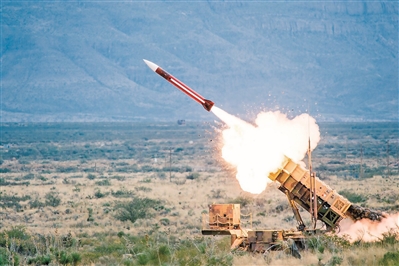
“爱国者”防空导弹系统
10月5日,以沙特阿拉伯为首的石油输出国组织(简称欧佩克)与以俄罗斯为首的非欧佩克产油国,在奥地利首都维也纳召开第33次部长级会议,决定自11月起将石油日均产量减少200万桶,一直持续至2023年12月。消息一出,国际原油期货市场价格持续走高,美国随即对沙特表示失望,更有言辞激烈的民主党籍国会议员扬言报复。
The Organization of the Petroleum Exporting Countries (OPEC) headed by Saudi Arabia and the non-OPEC oil producers represented by Russia held their 33rd ministerial meeting in Vienna, the capital of Austria, on October 5, and decided to cut the daily oil production by 2 million barrels starting in November and lasting till December 2023. The international crude oil futures price shot up at the news, and Washington expressed its disappointment at Saudi Arabia, with some radical Democratic senators vowing vengeance.
今年7月,拜登曾访问中东,亲自赴沙特“找油”。此后,美国又联合欧洲盟友不断对沙特、阿联酋等国施压,促其增产,但成果寥寥。此次欧佩克与非欧佩克产油国大幅减产,更是直接亮明态度。不少美国民主党政客愤怒指责沙特等国的做法是“背后捅刀”。
Biden visited the Middle East and asked Saudi Arabia for more oil supply in July this year, after which Uncle Sam, along with its European allies, kept pressuring Saudi Arabia and UAE to increase production, but to little avail. The announcement by OPEC and non-OPEC oil producers to slash their production is an unmistakable declaration of their position, which many US democrats have slammed as stabbing America in the back.
当前,美国内选举政治升温,欧佩克与非欧佩克产油国的减产决定引发新一轮争吵。美共和党政客指出这是一场巨大的“外交失败”,美国在中东国家“丢了面子也折了里子”,已经难以控制国内通胀加剧导致的经济困局。美民主党议员也纷纷加大对沙特等海湾国家的抨击力度。10月6日,3名民主党议员提案要求撤回美国在沙特及阿联酋部署的军队和导弹防御系统。10月10日,美参议院外交关系委员会主席梅嫩德斯敦促政府冻结与沙特的一切合作,包括军售与安全合作。
Now that Washington is warming up for the mid-term election, the oil producers’ latest decision has triggered a new round of quarrels. The Republicans called it a huge diplomatic failure as the US was seriously humiliated in the Middle East and is unable to control the economic woes resulting from the rising inflation, while Democrats have bombarded Gulf countries including Saudi Arabia. On October 6, three Democratic senators proposed a bill to withdraw American troops and missile defense systems from Saudi Arabia and UAE; on October 10, Bob Menendez, chairman of the Senate Foreign Relations Committee, urged the US government to freeze all cooperation with Saudi Arabia, including arms sales and security cooperation.
对此,美国白宫不得不采取若干反制措施。首先,释放更多战略石油储备库存,以平抑油价。其次,要求能源部长寻求额外措施立即增加国内产量。再次,考虑放宽对委内瑞拉的制裁,重新开放其石油出口。最后,促请两党资深参议员推动“反石油生产和出口垄断法案”,对欧佩克施加压力。整体来看,目前,美战略石油储备已降至近40年最低,难有更大释放动作,其他举措则是“远水难解近渴”,反制力度有限。
The White House was therefore obliged to take a series of countermeasures. First, it released more strategic oil reserves to keep down the oil price. Then it asked its energy secretary to take extra measures to increase domestic oil output immediately. It also considered relaxing the sanctions against Venezuela and allowing it to export oil. At last, it asked senior senators of both parties to push the “No Oil Producing and Exporting Cartels Act” to put pressure on OPEC. Overall, America’s strategic oil reserve has fallen to the lowest level in nearly 40 years and cannot make a bigger contribution, while other measures are too slow to be able to effectively address the immediate problem.
当前,大国博弈格局不断变化。放眼中东,美国战略力量持续收缩,中东地区形势呈现三大趋势。一是持久纷争后,和平与发展逐渐成为地区国家共同诉求,沙伊关系、阿以关系同步缓和。二是域外力量对中东的影响趋于多元平衡,地区国家战略自主性不断上升。三是以海湾阿拉伯国家为代表的地区强国,正着力寻求适合自己未来发展的改革之道,在变局中谋求新的有利位置。在这一复杂背景下,欧佩克与非欧佩克产油国的减产决定正是沙特等国求新求变、以更加独立自主的姿态谋求自身利益最大化的题中之义。
The landscape of major-country competition is in constant change now. With America’s strategic forces contracting, the Middle East is showing three trends. First, peace and development have gradually become the common demand of regional countries after prolonged conflicts, with the Saudi-Iran relations and UAE-Israel relations easing. Second, the effects from external forces on the Middle East almost reached the equilibrium, while the regional countries are getting more strategically independent. Third, regional powers represented by the Gulf countries are searching hard for a path of reform and development suitable for their own conditions and seeking a new, vantage point amid the changes. Against such a complex background, the OPEC and non-OPEC oil producers’ decision to cut oil production is just an integral part of Saudi Arabia and other Middle Eastern countries’ efforts to break new ground, clear new space, and maximize their interests in a more independent posture.
当前,沙特、阿联酋等国对内需突破“石油诅咒”(指蕴藏丰富石油资源的国家在开发石油资源的过程中未得到良好发展,反使民众陷入困苦)和人力资源匮乏等困境;对外需与美国等产油大国持续竞争,并应对地区纷繁乱局。因此,近年来,沙阿两国试图以能源产业转型为核心,推进两国财税、劳动力市场和社会文化等领域改革,赋予国家新的内生发展动力。
At present, countries like Saudi Arabia and UAE must break the “oil curse” (oil curse means oil-rich countries haven’t achieved good development in the process of oil exploitation but have instead left their people in poverty and misery), the scarcity of human resources, and other dilemmas internally. They must also engage in sustained competition with America and other oil producers and tackle the complicated regional chaos externally. In recent years, Saudi Arabia and UAE, with the transformation of the energy industry as the pivot, have tried to reform their finance and taxation, labor market, society and culture, and other sectors, eager to inject themselves with a new, homegrown drive for development.
不过,美国在中东退而不离,仍希望以“离岸平衡”发挥影响,而沙特对美安全依赖等核心诉求未发生根本变化,故而也不会与美国决裂。可以预计,欧佩克与非欧佩克产油国减产既因利益而来,也将因利益而变。
However, the US still holds sway over the Middle East despite its shift of strategic focus and hopes to throw its weight around through “offshore balance”, while Saudi Arabia won’t easily drift apart from America either because it still depends on US’ security protection. It’s foreseeable that the decision of oil production cut may be altered because of interests – just as it has been made.
(作者单位:新疆大学政治与公共管理学院)
(The author is from the School of Politics and Public Administration, Xinjiang University)













